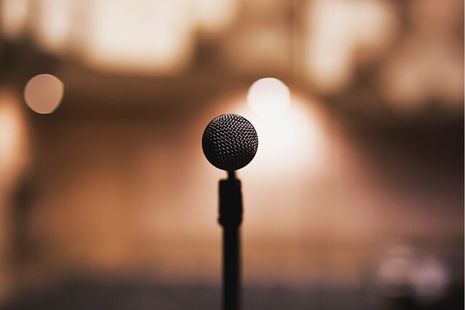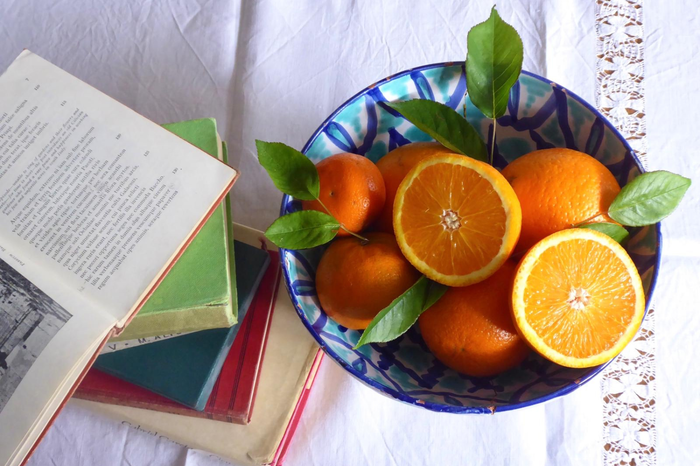Walking into my first Cambridge open mic
Rachel Jones recounts her experience of Cambridge student poetry at an open mic event

I walk down the steps into Trinity Hall's college bar with trepidation (you never quite know what you’ll find on the other side of an ad in the English Faculty newsletter). It is small and made cosy by the warm brown of the wooden counters and the squashy leather sofas and chairs arranged in uneven rows to form a makeshift audience. Small groups of people stand around chatting – the murmuring of words is expectant, anticipatory – like the hum of an orchestra tuning up to play a symphony. There is a microphone set up at one end of the room and a girl reminds us to write our names on her list if we want to perform. I buy myself a pint and sit down to listen.
“I think of the value of opening up such a space – intimate, welcoming, low-stakes – offering the chance to share creative work, and to converse with strangers through art”
The first girl who performs sings three original songs, which surprises me – I’d imagined that the evening would be purely spoken word. This is, then, my first reminder of the gap between poetry on the page and poetry received aurally, or the kind of alchemical transformation words undergo when going from penned characters to articulated sounds. She sings beautifully, with a strong voice that leans into the beat of her songs and fills the small bar, accompanied by a guitarist. Then there is spoken poetry, in wonderful, multicoloured variety. Someone reads a reflection on the loss of their grandfather; another a rolling, fast-paced lyric on naming; another a poem that she introduces as one about hating, but at its core seems to be more about love, shapeshifting. There is more singing: a bittersweet musical theatre ballad and a tender, wistful waltz with guitar dedicated to Sylvia Plath. Then, a poem exploring heritage through an invocation of the Nile that feels ready to hum through the floorboards and fly off out of the open door, and a spontaneous piece about a lunchtime concert.
“This is a special kind of conversation, in which you are invited to listen only, while the performer absorbs your mind”
It is the intimacy of the event that is most striking to me. This is a special kind of conversation, in which you are invited to listen only, while the performer absorbs your mind in a moment of shared thought, feeling, imagining, in tandem with their own. When it’s your turn to perform, you can open up your own exchange, and then conduct the listeners wherever you choose, but each time, the audience agrees to hear whatever the performer chooses to convey – to consider it, engage with it, and handle it with care. We are handed confessions of grief, loneliness, intimacy, pride; each is received with reverence.
Of course, it is also a performance, and each person who recites approaches this element differently – in the way they curate their body language, the tone of their voice, or the way they introduce their work. Yet while there is this factor of premeditation and artifice, each performance still feels very honest. This part of the event is particularly captivating – the act of setting out to share something candid with an audience, dressed up in art. Inexplicably, there is an attraction there – to be intimately known, to some degree, by strangers.
I walk home later that evening inspired – to write more creatively, more openly, more generously. The open mic has taken me out of my English degree for a few hours and reminded me in a different way of the idiosyncrasies of words; how they sound and resonate; how they address, engage, interrogate, unsettle. I think of the value of opening up such a space – intimate, welcoming, low-stakes – offering the chance to share creative work, and to converse with strangers through art for a few hours.
 News / Judge Business School advisor resigns over Epstein and Andrew links18 February 2026
News / Judge Business School advisor resigns over Epstein and Andrew links18 February 2026 News / Hundreds of Cambridge academics demand vote on fate of vet course20 February 2026
News / Hundreds of Cambridge academics demand vote on fate of vet course20 February 2026 News / Petition demands University reverse decision on vegan menu20 February 2026
News / Petition demands University reverse decision on vegan menu20 February 2026 News / CUCA members attend Reform rally in London20 February 2026
News / CUCA members attend Reform rally in London20 February 2026 News / Caius students fail to pass Pride flag proposal20 February 2026
News / Caius students fail to pass Pride flag proposal20 February 2026










